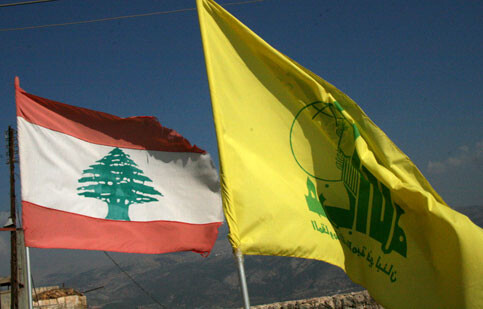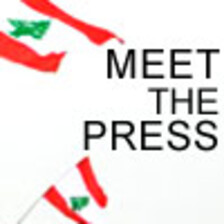Electronic Lebanon 3 December 2007

Whether to disarm Hizballah, whose flag flies alongside that of Lebanon’s above liberated Khiam prison in southern Lebanon, is a central issue of Lebanon’s political impasse. (Maureen Clare Murphy)
It seemingly took a stillborn conference like Annapolis to break the deadlock in the Lebanese presidential crisis. In a surprise move this past week, the March 14 camp nominated Lebanese army chief Michel Suleiman for the presidency. Suleiman had been considered a preferred candidate for the opposition camp. His long-standing support of the resistance against Israel and his amicable relations with Damascus made him agreeable to the opposition camp. But the army’s recent assault on Nahr al-Bared refugee camp endeared him to the Americans as well. Now, he is emerging as the man of consensus. But none of Suleiman’s attributes has changed in the past two months, which raises the question of why did all the parties involved bicker over every constitutional provision and expose the hypocrisy of confessional democracy before they agreed on the name. Many political observers point out that Suleiman’s nomination was not the result of an awakening of the Lebanese politicians, but a reflection of regional developments, including the apparent rapprochement between Syria and the US.
Others say it was a desperate attempt by the March 14 to create a wedge between Hizballah and Michel Aoun who had until the public nomination resisted accepting any candidate for the post other than himself.
Whichever the cause, the choice of Suleiman suggests that the March 14 movement has been forced into a concession as the “Cedar Revolution” may be sacrificed by the US in the interest of wooing Syria away from Tehran. But there is no guarantee of what sort of president Suleiman will be. And his ascension to power is unlikely to resolve the big questions dogging Lebanon, top among them the disarming of Hizballah, and may turn out to be a band-aid solution.
George Alam of As-Safir examines the extent to which Syria’s participation in Annapolis changed the outcome of the Lebanese election. Khaled Saghiyyeh of Al-Akhbar reflects on the role of the military in a supposed democracy and the likelihood of a “Faustian” alliance between the warring groups akin to past ones that cared little about the interest of the country. Imad Mrammel of As-Safir and Hiyam Kossayfi of An-Nahar offer various readings of what led to choosing Suleiman as a candidate of compromise. Mrammel cautions that several obstacles need to be removed before the army chief is “elected” into office and suggests possible arrangements for a future government that might be needed to close the deal. (The following are translations of edited excerpts).
As-Safir, 29 November 2007, George Alam, “The participation of Syria in Annapolis changes course of local politics”:
Sources suggest that consultation rounds convened in the margins of the Annapolis conference to discuss the Lebanese crisis have favoured certain courses of action over others. These include the necessity of filling the presidential vacuum and the agenda of the first government formed under the new president’s tenure.And these sources conclude the following:
First: The American-Syrian dialogue that resulted in Syria’s willingness to participate in Annapolis also produced an agreement over bringing a consensus-based president to power in Lebanon.
Second: There is a consensus among the US, Europe, Arab and regional forces that the new president must be a tested military and neutral individual due to the fragile domestic situation on all fronts.
Third: That an Arabic endorsement for such a solution was secured, and Egypt had launched that endorsement a while ago.
Al-Akhbar, 30 November 2007, Khaled Saghiyyeh, “Me or War”:
When there is a political crisis, countries with parliaments usually resort to elections. When there is a political crisis, Lebanon resorts to generals. Running away from politics is a game mastered by Lebanese leaders and practiced with an unbearable lightness. As such, the party in power considered any talk of early [parliamentary] elections a constitutional violation and a rigging of the will of the people. But the same authority welcomes amending the constitution to bring the army’s chief to the presidential post. In other words, when the party in power decided to offer a concession, it preferred making it to the will of the military rather than the will of the people.This is happening within a few days of the end of the bitter experience of [former president and general] Emil Lahoud, and while Nahr al-Bared camp is still a disaster zone where horrific actions took place.
We are not confronted with someone, who like generals, is asking us to choose between more freedom or more justice. We will certainly be witnessing a comeback of the alliance between class-biased economic policies and the boot of military oppression.
We witnessed such an understanding in the first half of the nineties. We can imagine the outcome of such an alliance when it is in conjunction with the formula of “me or civil war.” As usual, the Lebanese will hearken back to the past bad epochs that tend to be replaced by worse ones.
As-Safir, 1 December 2007, Imad Mrammel, “The chess game between the government and opposition … and Suleiman waits for the ‘decisive move.’:
A scrutinized inspection … shows that paving the way for [army chief Michel] Suleiman to the Baabda [presidential] palace continues to require a huge effort that will to guarantee the end result. And it is clear the deep mistrust between the government camp and the opposition casts its heavy shadow on the current consultations surrounding the nomination of the army head for president.And it is pointed out that the personal characteristics of the president or his powers is not sufficient following the Taif agreement to guarantee the efficiency of the presidency and assuage the Christians if other parties in power exhibit a willingness to monopolize decision-making as the current experience has shown.
In the meantime, the opposition parties have not reached a unified reading of the real motivations behind the “coup” among the March 14 forces in the shift of its stance vis-a-vis nominating general Suleiman. Some consider that [March 14] acceptance of the army chief is merely the product of a realistic reading of international and regional developments such as the recent rapprochement between Syria and the US which has made March 14 persistence in prolonging the stand-off with the opposition a quixotic exercise. This while keeping in mind that [Sulieman] is known for strengthening the ideology of enmity with Israel and amity with Syria and the harmonious existence of arms among the resistance and the army. In sum, some political observers believe that the majority [March 14] is now faced with two options: Michel Suleiman for president and a third-party figure for prime ministeror Michel Aoun for president and Saad Hariri for prime minister.
An-Nahar, 2 December 2007, Hiyam Kossayfi, “Doubts in a Compromise without Signals from Iran and Syria”:
There are still those who are skeptical that things will reach a happy ending so quickly. Those skeptics say there is a hasty reading of the outcome of the Annapolis conference. Syria, for instance, did not obtain anything beyond a promise to look into the Syrian-Israeli track during the meeting scheduled for Moscow in early 2008. And Syria has also failed to garner full Arab support for its participation in Annapolis and her attempt to decouple its ties with Iran …And this means that the conference, in the eyes of observers, is a cover-up for any US move against Iran, and an attempt to woo the Arab street with the Palestinian cause and gain favour with the Arab states, that latter something Washington knows is going to be difficult as a result of the Saudi opposition to any US military action against Iran.
Meet the Lebanese Press is EI’s twice-monthly review of what is making the rounds in the Lebanese press and the pundits’ take on it.
Hicham Safieddine is a Lebanese Canadian journalist.
Related Links





